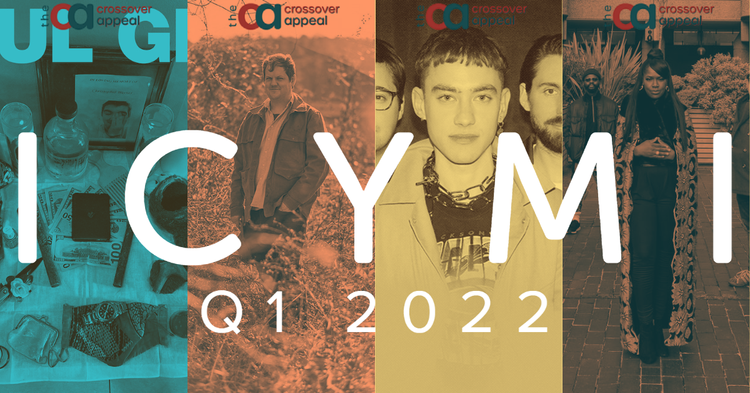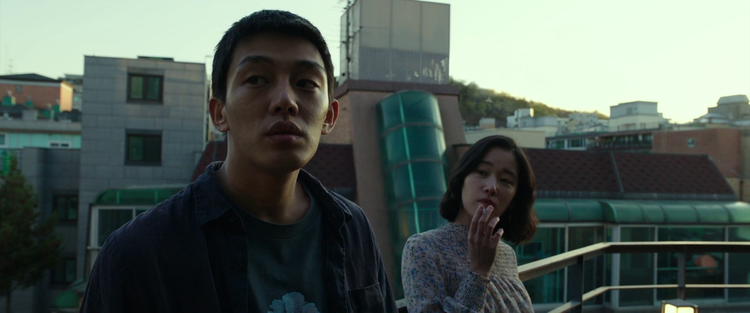April 2: How do I not cast a shadow?

Don’t worry. I have nothing to say about last week’s Oscar night and the slap that has already tormented The Discourse these past few days.
Instead, I’m thinking today about disavowal, cancellation’s older, more formal cousin. Disavowal is what you do when a thing you once loved or believed with your whole heart somehow falls off the pedestal upon which you placed it. Disavowal is the shadowy underbelly of growth, it is the childish things you have left behind. When we disavow we refuse connection to the thing we maybe always were. It’s a severing with the tastes of yesterday for the possibility of a different palate in the future. And yes, should disavowals from enough people accrue widely and loudly enough, perhaps there’s a cancellation after all.
The recommendations on tap today are all interested in some way in disavowal - or the refusal of it. The New Testament says that if your eye offends you, pluck it out, a logic that might resonate more in the year two thousand and twenty two than it has for some time. It’s an idea that immediately tests the limits of disavowal - because, sure, you’ll no longer sin with what you see, but you will be indelibly marked by it, perhaps more than you would have had you simply left well enough alone. The eye may be gone, but the socket still stares. If disavowal is a way to cut yourself off from the past that complicates the present, won’t the sudden absence suture you to the thing just the same?
This has gotten a little grisly. Let’s just say that if, as the midwestern poets have said, “who I am hates who I’ve been”, perhaps it’s worth pausing before the point of disavowal to ask whether or not a certain amount of continuity might do us good.
Watch: “Anthony Bourdain: A Love Story” by Lola Sebastian
CW: Suicide, discussion of #MeToo and sexual assault
When I fired up this video essay from a creator whose work is new to me I wasn’t sure what I’d be in for. I’ve avoided Roadrunner mostly because the director’s Mister Rogers’ documentary was a horrible mess and I couldn’t bear to see what he would do to a much more conflicted and tragic subject. I’ve also avoided Bourdain’s catalog since his death, finding it largely too painful to watch and read, his voice having been too formational for me and his death stinging too sharply at the intersection of a million sensitivities.
But what I found across this video’s 90 minutes was a deeply thoughtful examination not so much of Bourdain’s work, but of the way his career and death - and the way both of those things have been and continue to be felt by millions like me - have become emblematic of our parasocial world. This was the kind of video that left me deep in reflection for hours and hours afterwards. There’s a section where Sebastian looks at the way Bourdain’s reflections later in life on manhood and misogyny to outline the territory of the ongoing toxic-or-not-toxic masculinity discourse that, at least for this very online writer, was the most lucid discussion of that matter I’ve ever seen. This video weaves together the dreams we have for men to be good (again?), the horrible pressures of celebrity, the privileges of travel, and the strange intensities of parasocial intimacies into my favorite video essay of the year so far. It’s long, but it’s unmissable.
Play: Tunic on PC, XBox, and Xbox Gamepass

I got my first video game console in the 00s after writing a paper explaining why buying the new Xbox with the money I got from my part time library gig would be a net benefit to the family. Before then, video games were more or less persona non grata at my house. And yet I loved the things, so when I went to a buddy’s house for a sleepover, if their entertainment center was blessed with a Nintendo or a Playstation, that I’d be camped out until the wee hours of the morning explaining whatever electronic delights were on tap.
Playing Andrew Shouldices’ Tunic has been like falling back into boyhood bedrooms and basements, staying up past one in the morning to squint at cathode ray tubes and cheaply printed manuals. Tunic is a simple enough pitch: wrap old school Legend of Zelda games in contemporary storybook aesthetics and add a dash of the Soulsbourne games’ approach to death and exploration, and presto magicko, there you have it. It’s an elegant recipe that we might see more iterations on with the success of this game, but Tunic is also soulful in ways that few other games are. It reaches deep into your chest with a single question: do you remember what it was like when not knowing felt good instead of scary?
Listen: Humble Quest by Maren Morris
Country music is fraught terrain. It’s a genre that is deeply wedded to ideas of authenticity and rural, salt-of-the-earth, America, but it’s also an expansive machine, defined as much by its artifice as any other massive culture industry. Myself, I was a kid during the heyday of pop country - Garth Brooks, LeAnn Rimes, Tim McGraw, Reba McEntire, Martina McBride, they all rode the strength of their rootsy storytelling and twangy hooks to superstardom. I like country best when it conjures worlds, and some of our best musical storytellers find their biggest audiences when dressed in sequins and boots. In other words, I love country that embraces the intimacy of a drink and a yearning heart alongside the glossy comforts of slick production and pop melodies.
Maren Morris captures that balance beautifully on Humble Quest. She’s got the kind of voice that begs to be sung along with, and she sings songs that dangle specificity like a hypnotist’s watch, lulling you deep into your own memories. It’s an album full of moments just out of reach and on songs like the title track, “Hummingbird”, and “I Can’t Love You Anymore”, you can practically feel the strain of it in Morris’ beautiful rasp. It’s balanced in a way that Morris’ friend and sometimes collaborator Kacey Musgraves struggled to achieve on her last record star-crossed. Morris’ work is emotionally honest without messiness. Not that there’s anything wrong with the mess, rather, just that Humble Quest feels blessed with a tempering wisdom that, despite the heartache, turns somehow into something like hope.
Watch: Barb & Star Go To Vista Del Mar on Hulu

Speaking of Reba, if the prospect of deus ex McEntire in the middle of a screwball comedy about middle aged friendship appeals to you, this movie is probably the the most slam dunk recommendation I’ll ever make. Kristen Wiig and Annie Mumolo are a riotous pairing as best friends looking to get their “shimmer” back by vacationing down at a Florida resort. It’s a strange mixture of a dozen comedic influences - I saw flashes of Austin Powers, Napoleon Dynamite, SNL, and Spy Kids of all things throughout. It’s a deeply silly movie that revels in its narrative excesses, occasionally to its detriment, but it never loses track of the central relationship that animates the whole thing into more than the sum of its parts.
The thing about Barb & Star is its dedicated refusal of meanness as a wellspring for comedy. The women at the heart of this movie are almost certainly the butt of the joke in any other film. It’s hard to imagine, for instance, Star showing up in the middle of Bridesmaids for any reason other than to be made fun of. But Barb & Star effortlessly mines Wiig’s and Mumolo’s chemistry for affection rather than derision. Perhaps their combination of naivete and open-mindedness is a mirage, but if it is, it’s one I could stand to fall for a few more times.
Take care of yourself this week. April's here and maybe things are looking up, and even if they aren't, maybe at least it will be warmer.
Jordan Cassidy






Member discussion